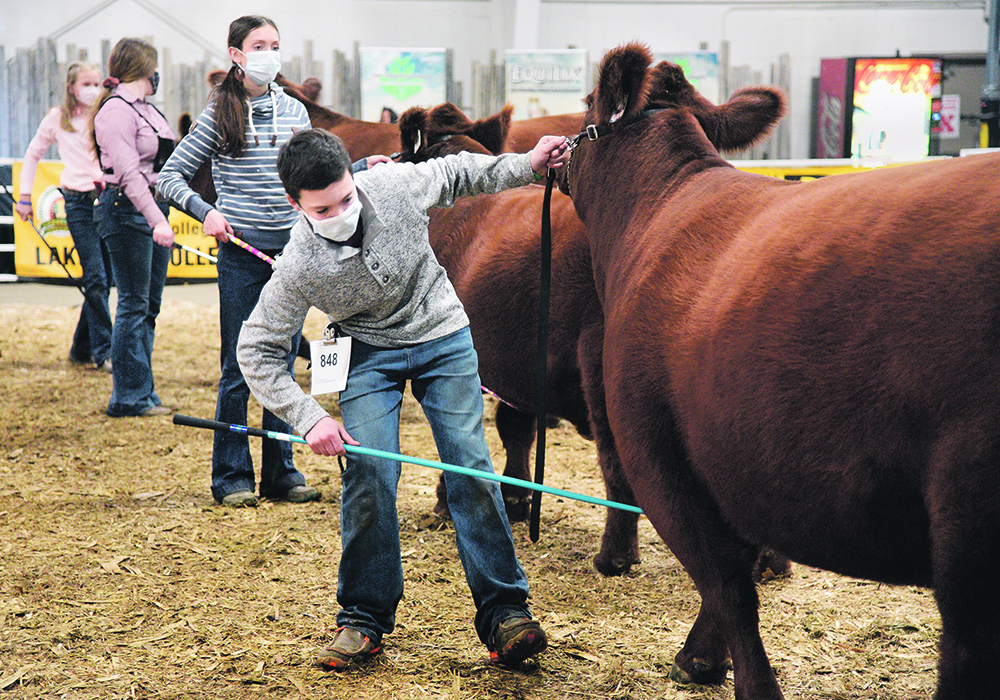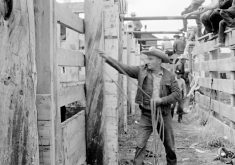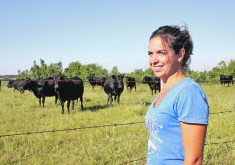The year 2020 will always be remembered as the beginning of the COVID-19 pandemic.
Many of the pandemic restrictions led to positive technological changes and new opportunities for rural families. During this decade, the changing roles and contributions of women in the Canadian agriculture industry were being studied and acknowledged.
All aspects of society were affected when COVID caused lockdowns and social distancing requirements, including the farming industry.
Read Also

Vintage power on display at Saskatchewan tractor pull
At the Ag in Motion farm show held earlier this year near Langham, Sask., a vintage tractor pull event drew pretty significant crowds of show goers, who were mostly farmers.
As early as April 2020, a survey conducted by the Agricultural Producers Association of Saskatchewan found that farmers were concerned.
“We’re hearing from farmers that their access to farm inputs like fuel, fertilizer, veterinary services and seed are already being disrupted,” said APAS president Todd Lewis, a grain and oilseed producer from Gray, Sask., in the April 16, issue of the Western Producer.
Farmers who sold locally grown meat and produce to the restaurant industry were hit particularly hard during COVID. Direct farm sales to the restaurant industry slowed to a trickle or ceased completely in many parts of the country.
The consumption of french fries was also drastically reduced, which affected growers across North America. For Alberta seed potato growers, who export 50 per cent of their crop, this meant a severe reduction in sales.
With restaurants closed and most people forced to stay at home, there was an increased interest in gardening, home cooking, baking and preserving.
Organic food sales were positively influenced by COVID as consumers began looking for healthy foods that could be locally sourced, which made farmers markets a logical option.
Provincial farmers market associations moved quickly to ensure the markets were deemed an essential service by their governments to prevent shutdowns.
Online services and pick-up/drop-off options were developed to make market shopping easier. Some vendors suffered, while others did well with the changes.
Traditionally farmers have always enjoyed chatting with their neighbours, suppliers, equipment dealers and grain agents over coffee. With lockdowns and face- to-face meetings restricted, new communication tools such as live chat and video conferencing became the norm for most businesses, including farmers and their families.
With improved technology and an increased need to communicate with urban consumers, some farmers began to post on social media. Manitoba dairy farmer Amy Smith used Integra, at “that farming.mama”, to posts about life in agriculture from a female perspective.
The closures of schools during the pandemic brought farm children home to do online schooling.
By the fall of 2020, many farm and ranch children were choosing to stay at home and continue their education through distance learning. They saw it as an opportunity to complete schoolwork without missing out on day-to-day activities such as raising animals and harvesting crops.
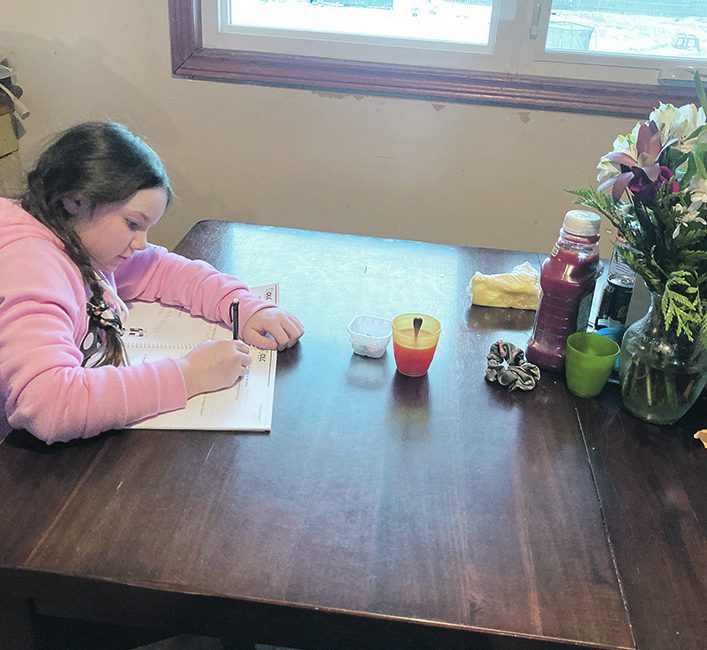
For Mia Mackie, who was 10 years old and in Grade 4 at the time, the kitchen table became her desk, and her mother, Kylie, stepped into the role of homeroom teacher. Twice a week, Mia would have a one-hour Zoom meeting with her 17 classmates and teacher to discuss lessons.
During one of her Zoom meetings, her 4-H cow was calving.
“She’s watching her Zoom call and looking out the kitchen window, watching her cow calve. Had she been in bricks and mortar, she wouldn’t have seen any of that,” said Kylie.
That was when the idea of distance learning really began to grow for the family.
“Agriculture is so important for these kids to be involved in because there’s so many life lessons they get to learn outside of the four classroom walls. When we sorted yearlings and loaded them on the truck, Mia was applying math and other skills she would have learned at school,” said Kylie in the Dec. 31,2020, issue.
“And when kids go to school, parents miss out on so many things that happen in their lives and it’s pretty cool to have them around to let them be involved in something that they’re interested in, too.”
Like other organizations, 4-H Saskatchewan suspended all in-person programming following the pandemic announcement.
In an effort to keep 4-Hers engaged while they stayed home, the Exploring 4-H @ Home virtual program was launched in April 2020. Through virtual programs, the organization was still able to hold its annual meeting, citizenship day and equine symposium.
Clubs worked to complete their year online or at home. Virtual 4-H judging clinics were held. Even the August summer camp was virtual.

Resources were prepared to support clubs in hosting virtual achievement days, and a webinar and resources helped members market their project animals.
“4-H is hands-on and learning to do by doing, but the pandemic gave our membership an opportunity to learn to do by doing in a different way,” said Cera Youngson, executive director of 4-H Saskatchewan, in the Dec. 31, 2020, issue.
The Canadian Women’s Institute was founded in 1897 in Ontario as a way to educate rural women and improve their lives and their family’s health through studying domestic science. On June 13, 2022, the Saskatchewan Women’s Institute dissolved, ending a 111-year history.
Women have always made major contributions on prairie farms, but until recently, gender roles were strictly defined: women ran the home and maybe the farm’s books, while men made the decisions and did the physical labour.
The 2021 Census of Agriculture found that 30.4 percent of Canada’s farm operators were female in 2021, up from 28.7 percent in 2016.
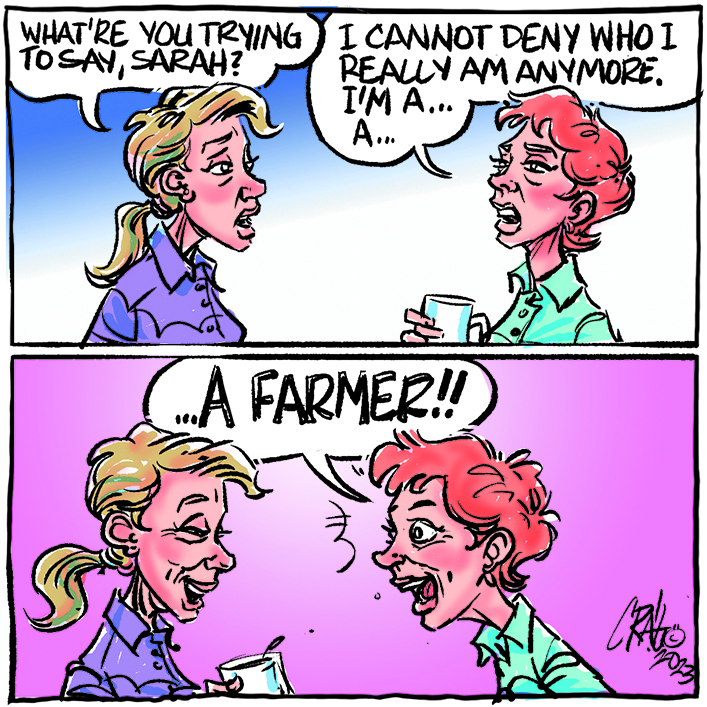
In 2023, Farm Management Canada and CentricEngine Inc. conducted a research study to identify the range of roles undertaken by farm women to better understand their experiences and contributions to the agriculture industry.
The results of the study illustrated that the diversity of activities undertaken by farm women far exceeds conventional views and underscores the fact that there is no typical role or average experience for a farm woman. The study confirmed farm women continue to face significant challenges and barriers that need to be addressed.
One of the more disturbing findings in the report was that women struggle to identify themselves as farmers, likely because too often they have been told they are “only” farm wives.
The Canadian Federation of Agriculture launched “Engaging and Advancing Women in Agriculture” in February 2023. The project was expected to develop, pilot and document a framework that producer associations could use to address under-representation of women in the sector.
Betty Ann Deobald, one of The Western Producer’s TEAM Resources columnists, will write a monthly column for the next year examining rural life in each decade of the last century.




